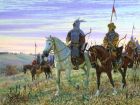HISTORY, The Ancient Bulgarians
The Ancient Bulgarians
The founders of what is now Bulgaria, having accepted and preserved their name over the centuries, have been the Bulgarians. Bulgaria?s history can be traced back to the most distant antiquity (1st millennium BC). The Bulgarians belong to the Caucasians (a white race), part of the big Indo-European family. Their ancient original homeland was Central Asia (the region of the Pamir and Hindu Kush mountains). Making up a highly civilized social formation, the ancient Bulgarians had long been a determining cultural factor in the Central Asian territories. They were carriers of extensive knowledge for the time in the sphere of the philosophical understanding of the world, the state administration, social structure, art of warfare, letters, language and construction. An important product of the ancient Bulgarian knowledge is the cyclical solar calendar, perfect from an astronomical point of view, in which the constellations have the names of animals. UNESCO has recognized the calendar of the ancient Bulgarians as one of the most exact from among the calendars known up to the modern age.
The religion of the ancient Bulgarians was far from the traditional idolatry, characteristic of the Ancient world. Tangra, the supreme deity of the Bulgarians, had no visible image. Tangraism is rather a philosophical and world outlook unity of three substantial concepts - Tan (universe), Nak (man) and Ra (God), a syncretism of a universal, profoundly considered philosophical formula. Embedded in its basis are the values of the Bulgarian world outlook: tolerance, loyalty and justice.
The Bulgarians have diverse contributions to the world treasure store. Ranking first is the idea of statehood, based on justice and tolerant attitude to the Other One, rejection of slavery and the organizing of a society of the free labour as far back as during the distant 2nd century A.D. Notable is the relatively early partial conversion of the Bulgarians to the Christian faith, who stood out in defense of the future All-European religion together with the Armenians in a battle in the Avarair field (451 A.D.). The Bulgarians killed in that battle were canonized by the Armenian Church as martyrs.
The Bulgarian statehood in Europe dates back to 165 AD, according to the oldest Bulgarian chronicle ?Name List of the Bulgarian Kans?. During the 7th century the powerful Kan Koubrat (632-665) headed the state, known as Old Great Bulgaria, an ally of Byzantium in its wars against the Avars. As a token of respect, Byzantine Emperor Heraclius gave Koubrat, who had been converted to the Christian faith in his childhood, the high-ranking Roman and Byzantine title of ?patrician? and generous gifts.
After the death of Koubrat in 665, Great Bulgaria was reborn into two new states: Volga Bulgaria in the region of the middle reaches of the Volga, and Danubian Bulgaria in the Balkan Peninsula. During the Middle Ages, the two states played the role of a shield, guarding the European political and spiritual space. Part of the Bulgarians remained in the composition of the Khazar Kaganate, others formed a state of their own in what is today Macedonia (the Bulgarians of Kouber) and in the Apennines (the Bulgarians of Altsek).
During the 10th century, the Volga Bulgarians adopted Islam as official religion and built one of the most brilliant Muslim civilizations during the Middle Ages. Conquered by the Mongolians of Chingiz Han during the second half of the 13th century, the state of the Volga Bulgarians was finally wiped out by the army of Russian Tzar Ivan Grozni in the middle of the 16th century.





